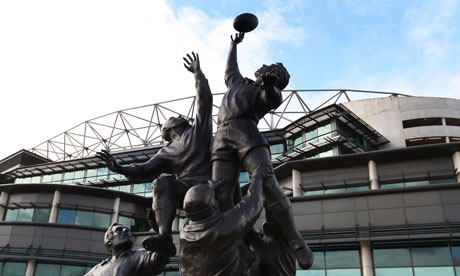
A few hours before Rob Andrew admitted that the Rugby Football Union had hit "rock bottom", the chief executive of the body expected to deliver the 2015 Rugby World Cup was proclaiming that the tournament would be a roaring commercial success in this country.
Paul Vaughan, who was speaking at a Rugby Expo 2011 conference taking place at a Twickenham rocked to its foundations by an unprecedented series of self-induced crises, may well be right. Whether there is an England side capable of winning it, and the extent to which the RFU is capable of capitalising on what all involved repeatedly claim is a key moment for the sport, will depend on the events of the next six months.
The recently published RFU annual report paints a picture of a governing body thriving commercially while falling apart organisationally. Whether the former can continue in light of the latter is another matter thrown into sharp focus this week: the sponsors O2, Nike and Land Rover (the last so pointedly criticised by the players in the leaked Rugby Players' Association report) are nearing the end of their contracts and will, at the least, use recent episodes as a bargaining tool.
When even the RFU chairman's report – written by Paul Murphy, who replaced Martyn Thomas after he replaced the sacked chief executive John Steele – is unable to avoid admitting that recent events have "not cast the RFU in a good light" and have "affected the reputation of the game" things must be bad. They got several times worse this week.
One of the many illuminating functions performed by this week's leaks has been to remind all concerned of the folly of their pre-World Cup insistence that turmoil in the boardroom at Twickenham would not transmit to the fields of New Zealand. One of the few areas in which there is any degree of unanimity appears to be that there was a lack of RFU support for Martin Johnson and his team.
The Blackett Report, prepared after the tumultuous and unnecessary ousting of Steele, recommended that every member of the board should step down (apart from Bill Beaumont, who is a co-opted member). Yet while around half the board changed over the summer, senior figures in rugby who are not part of the Twickenham structure believe that there are still too many conflicted vested interests and too many members of the board who are protecting their backs.
There is a fear that history will repeat itself unless governance reforms are enacted and a new chief executive is recruited before any decisions are made about the elite performance side and a new England coach.
The sports minister, Hugh Robertson, will keep a close eye on how the wide-ranging recommendations of a Slaughter and May report into corporate governance, which is to be presented to the RFU council a week on Friday, are implemented. There is a feeling that the RFU's problems are to do with structure and personality. And while Robertson's comments about the elite performance role have gained headlines, he too believes that it is only with the correct governance structure and the right people in those roles that the playing side can be adequately resurrected.
The RFU council is thought likely to act as a roadblock to reform, and key figures on the board are expected to act similarly. Some outside Twickenham believe that the only way forward is to clean the stables. One former RFU executive said: "All of those culpable for what has gone on over the past 12 months should be looking at themselves. There are too many people still covering their backs. What is John Spencer's place in all of this? Or Bill Beaumont's?"
Stephen Brown, the chief financial officer who will take over from Thomas as acting chief executive next month, is widely admired. There is hope he can steady the ship but consternation at the fact that Thomas has remained in post throughout this latest debilitating episode.
The willingness to drive through the reforms recommended by Blackett's hard-hitting report, which Thomas tried to suppress, and now by Slaughter and May will have to come from within. It is understood that any suggestion of withdrawing government support for the 2015 World Cup is wide of the mark, leaving Robertson with few levers beyond public pressure. Equally crucial will be the views of the thousands of volunteers who sustain the grassroots. The delicate balance of relations between the club game and the RFU will also be a key factor.
There are genuine fears that credible candidates for the chief executive's post – with the necessary skills and gravitas to finish the job that Steele started in dealing with structural and staffing issues while providing the confidence to enter key commercial negotiations on the front foot – will have been put off by the latest public fiasco. The only crumb of comfort for potential applicants, beyond the fact that at least the issues are being confronted and that they may have a genuine mandate for change, will be that the only way from here is up.

